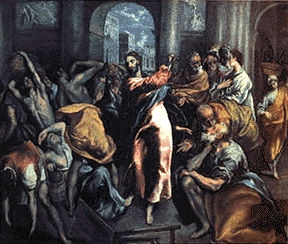
AnthonyFlood.com
Philosophy against Misosophy

Jesus Is an Anarchist
James Redford
17. Jesus Engaged in Conspicuous Consumption When He Could Have Provided for the Poor Instead
Some have maintained – usually in an effort to make some larger political point – that Jesus was some sort of ascetic who was against individuals having material riches, especially when those material goods could be used to provide for the poor instead. Yet Jesus Himself engaged in conspicuous consumption when He could have provided for the poor instead:
Matthew 26:6-13: And when Jesus was in Bethany at the house of Simon the leper, a woman came to Him having an alabaster flask of very costly fragrant oil, and she poured it on His head as He sat at the table. But when His disciples saw it, they were indignant, saying, "Why this waste? For this fragrant oil might have been sold for much and given to the poor." But when Jesus was aware of it, He said to them, "Why do you trouble the woman? For she has done a good work for Me. For you have the poor with you always, but Me you do not have always. For in pouring this fragrant oil on My body, she did it for My burial. Assuredly, I say to you, wherever this gospel is preached in the whole world, what this woman has done will also be told as a memorial to her." (See also Mark 14:3-9; Luke 7:37,38; John 12:1-8.)
Yet here in this case of luxurious consumption on the part of Jesus is purely of ornamental value, i.e., of a purely aesthetic value – and a fleeting one at that! When Jesus's disciples complained about this "waste" Jesus told His disciples to stop bothering the woman about it! At the very least, this demonstrates the notion that Jesus was some sort of austere, principled ascetic to be an untenable one – and thus also, any attempt to make some larger political point out of such a notion is automatically moot.
As well, Paul had this to say as to one's ultimate responsibility in providing for others:
2 Thessalonians 3:10: For even when we were with you, we commanded you this: If anyone will not work, neither shall he eat.
Next
18. Jesus Has Called us to Liberty – Yet Those Who Pay Taxes Are Not Free!